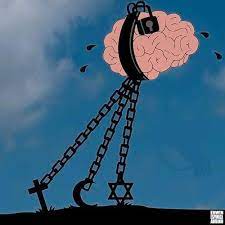Freeing oneself from the grip of religion
Question or objection
Even if they are convincing from a rational point of view, there is something that atheists do not understand in religion and in the attachment of believers to their faith because they have not experienced a religious adventure.
Answer
Attachment to religion is quite natural. Indeed, human beings do not primarily care about the truth, because they first ask for reassurance. Against the scarecrow of the Last Judgement, a protection must be built. The desire to believe is often formed in childhood, then invested in faith. It is quite normal that, in a first movement, the survival instinct and the attachment to the missing persons take precedence over a reflection with a concern for objectivity. But, since religion takes us out of reality, it is reasonable to go beyond this spontaneous reaction which turns into fantasy. Giving precedence to desire is a form of pride that a lucid adult should renounce. I prefer to see the worries and tragic aspects of life manifested through the arts.
If you have been given a positive image of religion, you will tend to look upon it with benevolence. On the other hand, if your image of religion is negative, you will want to distance yourself from it. In order to distance yourself from religion, there must be a strong motivation to do so from the start, otherwise nothing will change. If you don't have a problem, you don't want to change. Or the opposite is true: those who want to avoid questioning themselves declare that they do not have a problem. It is more rewarding to be strengthened in one's beliefs than to be destabilised. No argument will take away the faith of a convinced believer.
Many people realise that religion has unacceptable elements. The dividing line is this: those whose minds operate in a religious mode conclude that religion must be reformed, but retained; others see the need to abandon religion. It depends, therefore, on the ability to come to terms with a lame religion whose embarrassing elements are deliberately concealed.
At the beginning of the desire to distance oneself from religion, there is a state of dissatisfaction, or the feeling of being under the weight of oppression, or an intimate wound. It may be the absence of religious emotion or a painful experience: a bereavement, a long stay in a closed community, or some other trauma. For example, I receive testimonies from people who are terrified at the thought of the Last Judgement and who are trying to assuage their fear. For me, it was five years of boarding school as a student in a school run by a religious congregation, and later a teaching position in a school that was both public and crypto-Catholic (i.e. public on the outside and Catholic on the inside). The weight of religion is expressed through social coercion.
At a certain point you feel that the cup is full, that it's enough, that it's time to react, that you have to get out of there. Whoever has become aware of having fallen into a trap finds the necessary energy to want to get out of it. So you have to back-pedal, turn the road upside down until you reach a crossroads that offers an escape route. If the decision to back-pedal is based on resentment, the backward movement will be more intense. Many atheists have had a real religious experience, but it ended badly. It is not a question of ignorance, indifference or incomprehension, but of disappointment, refusal and rejection of religion.
The ensuing reaction can only depend on one's past. The concern to believe "well" must give way to the desire to believe "less". It is a question of entering into a process of de-indoctrination. We implicitly make a list of things we are not willing to give up. Depending on the person, these may be: the existence of God, God is good, Providence, the Ten Commandments, eternal life, paradise, the protection of a guardian angel, the comfort of a community, the protective effect of prayer, the hymns of Bach, the smell of incense, the taste of religious ceremonies, a relationship with a spiritual guide, childhood memories, and much more. Here it is necessary to realise that the longer the list, the more difficult it will be to find a way out. My personal position has made it not too difficult for me, because the only thing I really care about is respect for human rights. While the "believer on the path of least belief" has to be careful with his emotional attachments, the atheist is characterised by his ability to travel light. It is precisely this kind of liberation that he who wishes to distance himself from religion must aim for.
The intensity of the attachment is a cursor on which it is necessary to act, otherwise we will remain in place. Initiating a spiritual process of dissolving attachments is therefore essential, but the result is usually only partial. Everyone does what they can, given the situation they find themselves in. I am constantly amazed to see how believers can accept, without showing the slightest shadow of critical spirit, as anaesthetised, the multitude of absurdities that their pastors make them swallow. It would be unseemly to respond to a homily that is received as a moral injunction. The ability to distance oneself from religion can be seen as a test on the theme: "To what extent am I capable of critical thinking?".
The means used depend on the culture of the subject. If someone has been indoctrinated by putting the bible at the centre, he or she will have to distance himself or herself from the bible, identify the contradictions, see that the bible allows one to support any thesis according to the excerpts that one wishes to highlight, become aware that the interpretation received requires accepting the authority to which one has a duty to obey, that this authority is debatable, etc. If the indoctrination was more concerned with the duty of submission to the authority of the Church and the teaching of neo-Thomism, one can see in my personal website what tools of defence can be used. I leave open here other configurations whose variations are infinite.
My intermediate conclusion is that the way out is necessarily personal, and that it would be useful to publish, not one testimony such as mine, but a thousand varied testimonies.
It would be unrealistic to make the expression "to put an end to religion" a social programme, because too many people indulge in the supernatural. For many, Christianity is reduced to a vague religiosity that has little to do with formal education. The majority of those who stray from religion tinker with a personal religion. They do not wish to live without religion, but to experience emotions outside institutional religions.
Since it can be harder to stop believing than it is to stop smoking,
many believers are tempted to make individualized accommodations.
"Believers on the path of least belief" generally think that atheism is not adapted to their needs and does not suit them, because they put the protection of their emotional attachments before the desire for coherence. They are therefore led to find a personalised way out that spares them conflicting interests, at their convenience. Their mental universes are furnished with taboos, each believer having his own, none being universal. It is a question of finding the point where the repulsive forces (obedience, duty, obligation, fidelity to the community, original sin, personal sin, guilt, sacrifice, renunciation, last judgement, purgatory, hell, ...) are compensated by the attractive forces (love, forgiveness, saving one's soul, paradise, eternity, guardian angel, solidarity of the community, happiness, ...). Typically, by putting the notion of sin into perspective:
missing Sunday Mass, having sex outside of marriage, remarrying, etc., are not mortal sins, but small venial sins; as long as no one has been killed, God, being good and just, will not punish us disproportionately with eternal hell,
Religion became almost sympathetic but, situated outside of Roman Catholicism, it became personal. For people who cultivate another sensibility, but in the same movement of an à la carte religion:
The Church of Rome having gone astray in the course of its history, I return to a Christianity closer to its origins, and I nourish myself on the Bible.
Other believers fall into the contradiction of wanting to detach themselves from their faith while affirming that their religion is sacred. I haven't listed the possible solutions, but I don't know of any that can convince me, because what is sought is not coherence, but a balance of feelings, in a position that can only be personal, subjective and difficult to transmit, and therefore not very credible for others, but which answers the adage:
«It doesn't matter if religion is well-founded, as long as it brings me beautiful emotions.»
As for becoming an atheist, this is something else that implies a change of paradigm and requires, at least during a transitional period, real self-sacrifice. But this does not prevent me from feeling solidarity with any attempt to abandon faith, whatever the path taken. It is possible to explain why some atheists have an attitude that is perceived as aggressive, while others have a rather restrained behaviour and words.
- The former were usually heavily indoctrinated, so the path to atheism was steep. They understand religion very well since they come from it. The emotional bonds formed by religious experience were not considered intangible data, but as material to be eroded.
- In order to dissolve sentimental attachments, they fuelled their rejection of religion with a thousand arguments about unacceptable and intolerable defects. As their inner struggle has been lively and has mobilised a debauchery of energy, it can spill over into the public domain. Unfortunately, this is my case, which is reflected in the writing of my site, which is also a therapeutic means of aiding reconstruction. Changing one's point of view in order to start thinking about everything differently, in a renovated setting, cannot be done overnight.
- A variant that is clearly visible on the internet is crude atheism, which manifests itself in contempt, insults or insults. Those who practise it differ from the previous ones by their difficulties to rationalise and their shortcomings in the means of expression, but they share the same goal of developing the de-sacralisation and dis-love of religion.
- The latter, often less indoctrinated, more easily arrived at atheism through religious indifference. Having never been in a state of crisis or revolt, they have a more discreet social behaviour.
To return to the question asked, one who is only at the beginning of the process of distancing himself feels all the more misunderstood that the atheist is far away from him, which is normal. He who is far away perceives another landscape. On the other hand, if he thinks that the space between them is impassable, it is either because his relations with religion have been rather cordial and his motivation to leave the faith is slim, or because he feels totally unable to extricate himself from religion. That said, no one is obliged to disengage completely from any belief. However, I welcome every step in this direction, however small it may be. Whoever moves away from religion finds himself in a phase of deconstruction of bonds.
After having gone around the problem, we come back to the starting point because we can't get out of this question:
«In my backtracking which, by its nature, is an operation of de-love, am I determined to radically question fundamental, substantial and emotionally charged elements of religion and then, if necessary, to renounce it?»
From now on, I stop believing
Before returning to the theme of faith, let us dare to make a comparison. In order to stop smoking, one must first desire it. Motivation can be found, for example, if one feels deleterious effects on one's health, such as coughing, bronchitis, shortness of breath. You may also want to spare your loved ones. But good resolutions are not enough, and support is usually very useful, for example a trusted person who acts as a coach.
The same goes for belief. First you have to feel the need to stop believing. This can be based on the painful effects of faith, such as feelings of guilt, fear of hell, disappointment after prayers without any concrete effect, confrontation with injustice, lack of divine breath on the Church, etc. All those who nourish their existential anguish with disturbing spiritual forces feel a malaise from which they wish to free themselves. But this is not enough, because we still have to act.
I don't believe in Hell.
I don't believe in a God who is judge and avenger.
I don't believe in Heaven.
I don't believe in the Last Judgement.
I don't believe in eternal life.
To accompany you on your "de-spiritualising" journey, you can draw on the free downloadable e-book
- The whole site Resisting religious indoctrination in one PDF document
And afterwards, don't you feel withdrawal symptoms?
Lovers of sweet coffee hate plain coffee because they find it too bitter. But if he is motivated, he can get used to reducing the amount of sugar, in successive stages, to zero. Afterwards, he is likely to find sweet coffee unpleasant.




Comments
Post a Comment